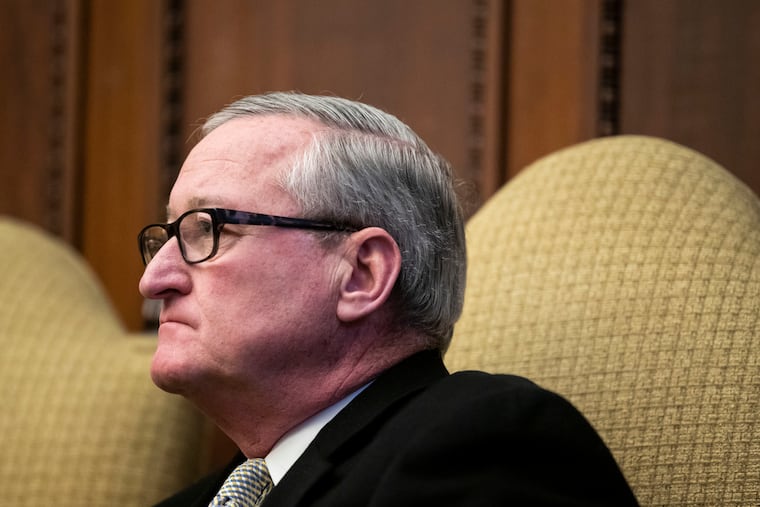Mayor Kenney pocket vetoes six bills as his first term ends
The so-called pocket veto of six bills was Kenney's first rejection of approved legislation. The bills would have imposed requirements on developers and given tax relief to low-income workers and homeowners, among other things.

Mayor Jim Kenney ended the year — and his first term — by killing six pieces of legislation that City Council passed in December.
The bills that Kenney rejected had no connecting theme. They would have required developers to give back to the communities where they build, lowered taxes for homeowners and low-income workers, banned food trucks from one block of University City, and changed development regulations in Society Hill.
“While the below bills all attempt to address issues of mutual concern, I cannot sign them at this time,” Kenney wrote in a letter to Council President Darrell L. Clarke. “I look forward to working with you and the new and returning members of City Council to continue to address these issues in the new year.”
The mayor did not overtly veto the bills, but exercised a power known as the pocket veto. Every four years, at the end of a City Council term, all legislation that the mayor has not signed or vetoed expires when a new Council takes office. That happens Monday.
It was Kenney’s first rejection of approved legislation.
In the new session, Council members can reintroduce the vetoed bills, all of which passed with overwhelming support. Clarke had championed the bill mandating that developers of big projects give help to affected neighborhoods.
“We look forward to the resumption of City Council in January,” said Joe Grace, a spokesperson for Clarke.
But Jim Engler, Kenney’s chief of staff, said he does not believe that the six bills, if reintroduced, would necessarily be passed in their current form in the next session, when Council will have four new members.
“There will be new chairs of committees, and there will be new committee members, so it will be a new Council, for all intents and purposes," he said. "We welcome continued conversation about each of these issues.”
Developers and community benefits
Grace said the mayor’s pocket veto of legislation requiring developers to sign community benefit agreements for high-impact projects was particularly disappointing. Such agreements promise benefits for the neighborhood, such as job opportunities, affordable housing, or new parks.
Community stakeholders “really engaged on this legislation, offered ideas, testified,” Grace said. “And also the business community.”
» READ MORE: Council advances bill requiring that developers give back to Philly neighborhoods where they build
Kenney, however, wrote in his letter that the city should not “be imposing this burden on development projects” until there is a better process for registering and maintaining community organizations, which would be responsible for cosigning the community benefit agreements with developers.
“While they have an important purpose, we as a government have not done enough to ensure that standards of process and conduct are followed by these organizations,” he wrote.
Zoning legislation
Three zoning bills also received pocket vetoes after passing with overwhelming support as part of Council’s longstanding practice known as councilmanic prerogative, in which members have the final say over land use matters in their districts, and colleagues agree to support those decisions.
Two would have changed zoning in Society Hill, represented by Councilman Mark Squilla. The city’s Planning Commission had recommended against their passage. The bills would have exempted Society Hill from complying with new historic preservation incentives, increased parking requirements, and restricted density, and would have added regulations Kenney called burdensome.
“This may inhibit creation of new affordable housing units on blocks that are very transit-oriented, accessible to jobs and amenities, and designed for multiple units,” Kenney wrote.
The third zoning “carve-out” bill would have prohibited food truck operators on Market Street between 33rd and 34th Streets.
» READ MORE: Drexel wants to evict food trucks from part of Market Street
Given the outcry from vendors and others affected, Kenney said, “further discussion is warranted before imposing such a sweeping ban.”
Councilwoman Jannie L. Blackwell, who sponsored the bill, lost a primary challenge from Jamie Gauthier, who will take office Monday.
Wage tax and homestead tax exemption
Kenney also pocket vetoed two tax-related bills. One would have offered refunds on the city’s wage tax to low-income taxpayers, and the other would have increased the annual property tax exemption for owner-occupied residences.
Councilman Allan Domb, who sponsored the wage tax refund bill, said he was surprised and disheartened by the pocket veto.
“This is a complete failure on your administration’s part to help individuals and families fighting to get out of poverty all across our city,” Domb wrote in a letter to Kenney Tuesday.
Kenney wrote in his letter to Clarke that the wage tax bill would be difficult to administer, and that the administration is looking into other options, such as grants, to offer similar relief.
Both of the tax-related bills blocked Tuesday should be considered as part of the city’s annual budget process in the spring because of their likely fiscal impacts, Kenney said.